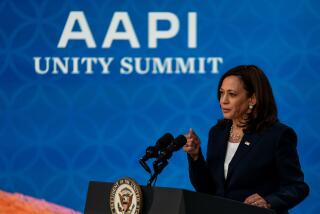Guess Who Voted Republican in ’94 : Gay rights: When pocketbook issues predominate, Democrats lose votes they traditionally take for granted.
- Share via
It is fashionable in some circles to lament the November elections as the triumph of the forces of bigotry. The reality is that whatever the nature of the new Republican majority, gay voters helped install it to a greater degree than in any election since 1980, when the patron saint of modern conservatism, Ronald Reagan, was swept into office in a landslide.
In the 1994 election, 32% of self-identified gay men and lesbians voted Republican--1 1/2 times the percentage who voted Republican in 1990 and 1992. The truth is that many gay voters are more conservative than the leaders of the major gay-rights organizations or most Republicans like to admit.
Until AIDS radicalized the gay community, many of us remained closeted and tended to vote like everyone else: out of economic self-interest. AIDS and the abortion battles changed that dynamic and caused many gays to embrace more liberal (and therefore Democratic) political candidates, a trend that culminated in the election of Bill Clinton in 1992.
Why did that trend collapse in 1994? For some lesbians and gay men, it was two years of perceived disappointments from the Clinton Administration, beginning with the President’s embarrassingly swift cave-in on ending the ban on gays in the military. His first appointment to the post of AIDS czar was depressingly inept, though funding for AIDS research and treatment was increased.
Yet while AIDS remains a central concern of many gay voters, a new generation of gay men and lesbians has emerged that has not been as directly touched by the disease. And the basic issue of the wallet reasserted itself this year, as the Republicans promised tax relief and cuts in government spending.
Whatever the reasons, the fact remains that gay men and lesbians voted Republican, in large numbers and openly. The party affiliation that dare not speak its name came out screaming Nov. 8.
Clearly, the risk to gay political and civil rights is great: Newt Gingrich’s party is also home to Rep. Robert K. Dornan of Orange County and North Carolina Sen. Jesse Helms. But can our search for true equality be successful if one party believes it need do nothing to keep our vote and the other thinks it can never win it?
More to Read
Get the L.A. Times Politics newsletter
Deeply reported insights into legislation, politics and policy from Sacramento, Washington and beyond. In your inbox twice per week.
You may occasionally receive promotional content from the Los Angeles Times.









